Making Everyone Better: A 4-H Member’s Perspective
go.ncsu.edu/readext?961999
en Español / em Português
El inglés es el idioma de control de esta página. En la medida en que haya algún conflicto entre la traducción al inglés y la traducción, el inglés prevalece.
Al hacer clic en el enlace de traducción se activa un servicio de traducción gratuito para convertir la página al español. Al igual que con cualquier traducción por Internet, la conversión no es sensible al contexto y puede que no traduzca el texto en su significado original. NC State Extension no garantiza la exactitud del texto traducido. Por favor, tenga en cuenta que algunas aplicaciones y/o servicios pueden no funcionar como se espera cuando se traducen.
Português
Inglês é o idioma de controle desta página. Na medida que haja algum conflito entre o texto original em Inglês e a tradução, o Inglês prevalece.
Ao clicar no link de tradução, um serviço gratuito de tradução será ativado para converter a página para o Português. Como em qualquer tradução pela internet, a conversão não é sensivel ao contexto e pode não ocorrer a tradução para o significado orginal. O serviço de Extensão da Carolina do Norte (NC State Extension) não garante a exatidão do texto traduzido. Por favor, observe que algumas funções ou serviços podem não funcionar como esperado após a tradução.
English
English is the controlling language of this page. To the extent there is any conflict between the English text and the translation, English controls.
Clicking on the translation link activates a free translation service to convert the page to Spanish. As with any Internet translation, the conversion is not context-sensitive and may not translate the text to its original meaning. NC State Extension does not guarantee the accuracy of the translated text. Please note that some applications and/or services may not function as expected when translated.
Collapse ▲This reflection was written by Sarah Beth Roberts, a current high school senior in the Orange County (NC) 4-H Program. Sarah Beth has been an active member for 8 years. As we celebrate National 4-H Week, Sarah Beth shares what it truly means to be a 4-H member and how 4-H “makes the best better”. Enjoy!
– – – –
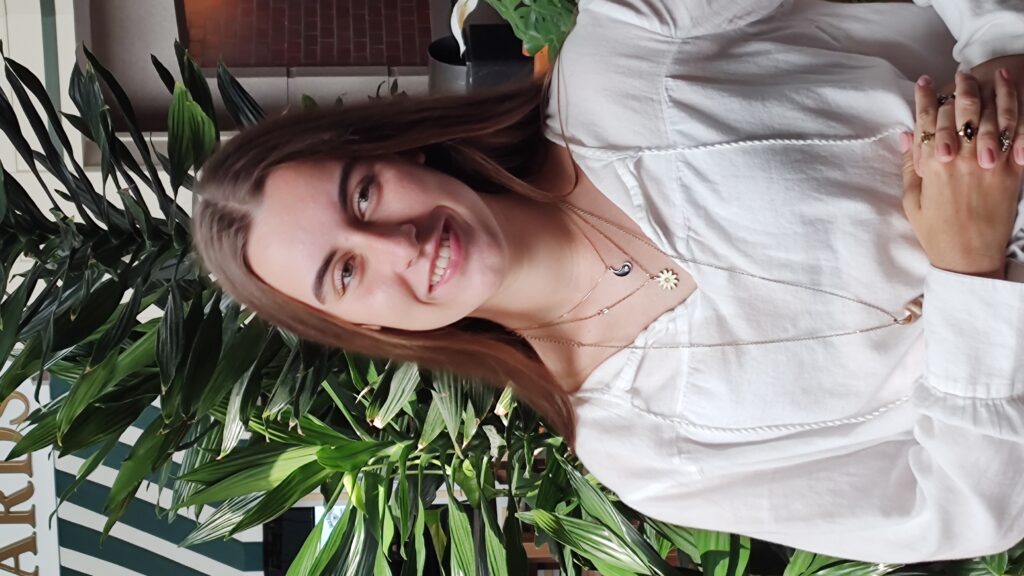
Sarah Beth Roberts is a 4-H member from Orange County, North Carolina. She is a high school senior and is active in the Backroad Sharp Shooters 4-H Shooting Sports Club as well as in livestock projects.
There is a recurring moment where one finds themselves with a teammate, co-worker, or classmate who is an absolute nightmare. The person clearly lacks simple soft skills and understanding. In a group project like I was in not too long ago, I was baffled at how people conducted themselves on a team. I believe the worst person to work with is one who wants to be in charge, has horrible communication, cannot work under pressure, and will not accept when they are wrong. Sadly, these characteristics are all too commonplace. Furthermore, there is a loss in society of skills that once upon a time everyone would learn, some critical to just survive. Such skills as sewing, cooking, and gardening. Many organizations pride themselves on bringing opportunities to young people, but none so far-reaching as 4-H. Striving to “make the best better” is its motto. In all fields, there is little comparison. Having grown up in 4-H myself, before that watching my older brother, and even before hearing the stories my mother and father would tell, I am happy to share what 4-H means to me. 4-H is one of the most beneficial extracurricular programs for kids ages 5-18 to be involved in, with immense benefit and educational value. From teamwork and professional skills to livestock and sewing, there is no better place for kids to learn and grow.
We who grew up going to 4-H community club meetings and events have memorized the 4-H Pledge off of everything from coffee mugs to posters and we have recited it on a regular basis. Some people get so excited that they even sometimes scream the last line! Here it is.
“I pledge my head to clearer thinking, My heart to greater loyalty,
My hands to larger service, and My health to better living,
For my club, my community, my country, and my world.”
The pledge is said before every club meeting, contest, class, really any time you might have a swarm of three or more 4-H members together. They will be itching to recite the pledge. It embodies what the whole organization stands for and all the reasons why it continues to be recited today.
Let’s start at the top: “We pledge our heads to clearer thinking”. Our 4-H volunteers and staff teach us to solve problems with our minds, even beginning with our Cloverbuds (our 5 to 7-year-old members). That does not simply stop at basic skills either. They strive for education in so many academic fields as well. The program I have the most experience with is livestock. Livestock programs teach youth the proper ways of caring for animals and the science behind why they are doing each task. There are also livestock judging events and competitions that teach kids to identify the characteristics of an animal and look out for deeper signs of good health or illness. These types of programs do not discriminate by age. A nine-year-old can participate in club activities with the high school youth and learn from the same teachers. But lessons and work are made available that are appropriate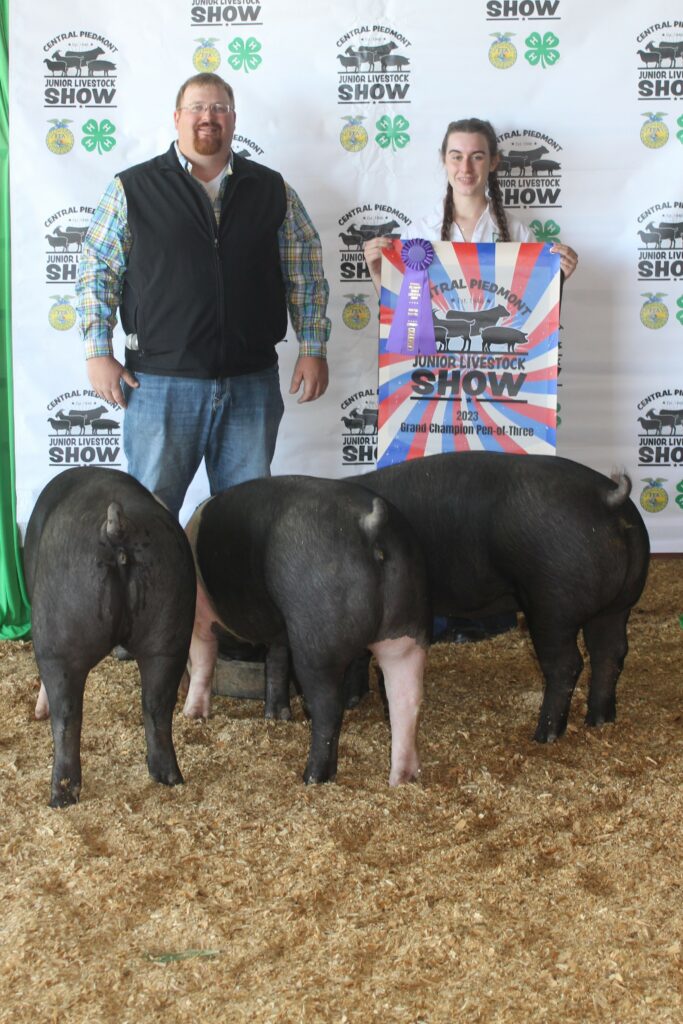 for each age. An example is the Youth For the Quality Care of Animals (YQCA) Certification. Young people are required to earn this certification to participate in livestock shows. To get this certification, a student has to take a short course that could cover the basics such as how to check for signs of sickness and make sure their animal is well-fed. YQCA could also require some math and science to help a child determine what gauge of needle to use for animal vaccinations. This is when the age ranges come in to make sure everyone is getting what will best serve them going forward in the program. Ages 5-7 are Cloverbuds, 8-13 are juniors, and 14-18 are seniors.
for each age. An example is the Youth For the Quality Care of Animals (YQCA) Certification. Young people are required to earn this certification to participate in livestock shows. To get this certification, a student has to take a short course that could cover the basics such as how to check for signs of sickness and make sure their animal is well-fed. YQCA could also require some math and science to help a child determine what gauge of needle to use for animal vaccinations. This is when the age ranges come in to make sure everyone is getting what will best serve them going forward in the program. Ages 5-7 are Cloverbuds, 8-13 are juniors, and 14-18 are seniors.
Next, we “pledge our hearts to greater loyalty”. Notice the heart is an important part of the pledge. There is a certain spirit to this organization and everyone who cares for it puts their whole heart into their work. In youth activities like sports teams, there is little difference between participants. Youth of similar ages and sometimes similar weight classes are put together. But with 4-H, there can be all kindergarteners in a class or a service project with kindergarteners and sixth graders. Combined opportunities give those sixth graders, usually the youngest group in middle school, a chance to be a leader. I know from personal experience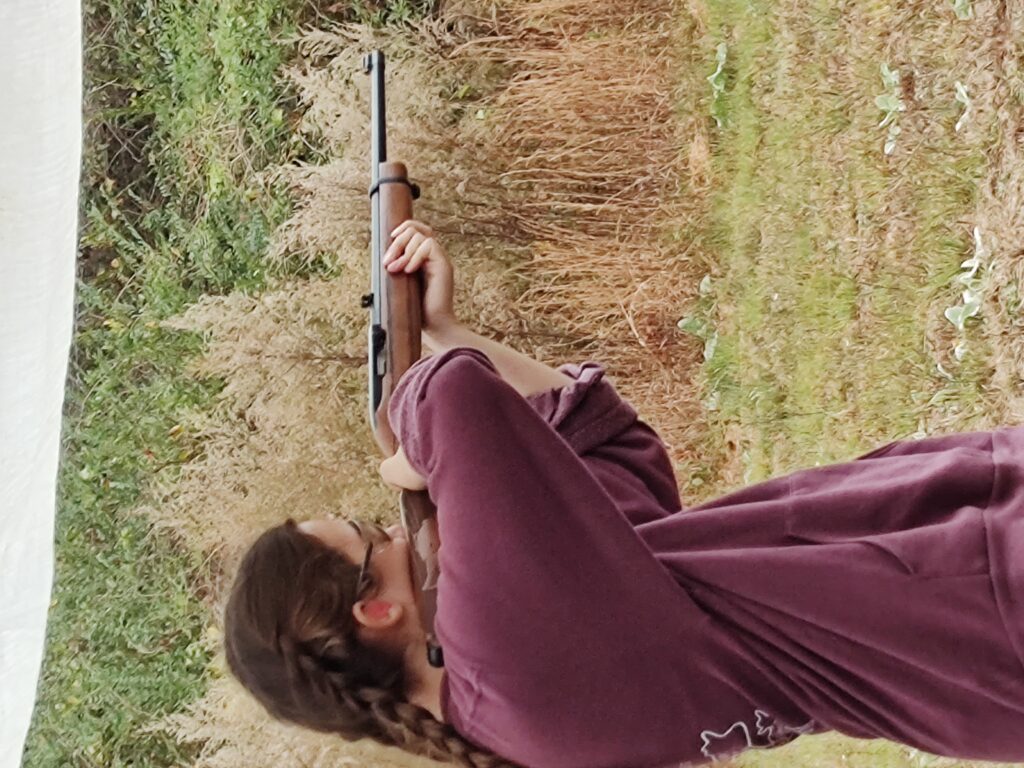 how amazingly quick a kid can mature and how much care and attention to detail they start putting into their work just by being given a younger child to mentor and look after. When I was maybe twelve, a girl a little younger than myself joined our marksmanship (shooting sports) club. We were on the archery line together. I knew most of the kids there and was by no means the best shot. She was new and a little worse of a shot than I was. So we got to hang out together on the far side of the line. It was easy to giggle at my missing the mark because it was my main goal to cheer her up about her shot. The feeling of making sure a younger member had a great time with a project or at an event is a better feeling than any personal triumph. Even though I am still one of the worst shots that came out of our group, I am glad that I got to cheer up a few people and make the meetings a little more enjoyable for hopefully everyone.
how amazingly quick a kid can mature and how much care and attention to detail they start putting into their work just by being given a younger child to mentor and look after. When I was maybe twelve, a girl a little younger than myself joined our marksmanship (shooting sports) club. We were on the archery line together. I knew most of the kids there and was by no means the best shot. She was new and a little worse of a shot than I was. So we got to hang out together on the far side of the line. It was easy to giggle at my missing the mark because it was my main goal to cheer her up about her shot. The feeling of making sure a younger member had a great time with a project or at an event is a better feeling than any personal triumph. Even though I am still one of the worst shots that came out of our group, I am glad that I got to cheer up a few people and make the meetings a little more enjoyable for hopefully everyone.
We “pledge our hands to larger service” to me means to lead with a servant’s heart. This may very well be what 4-H is best known for. Other youth programs like to have an act of service at least once yearly to teach their members to give back to 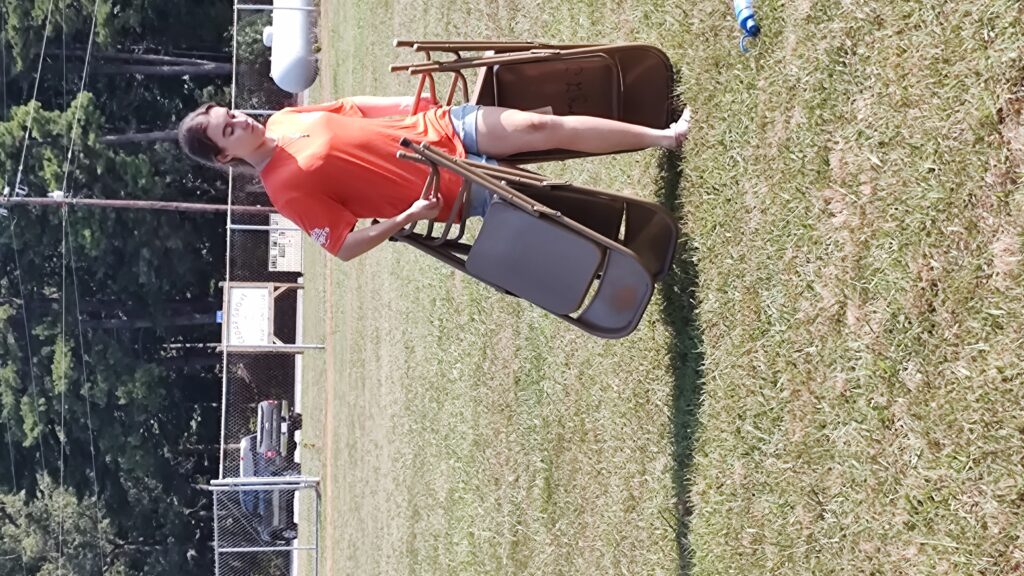 the community. But that is not enough for 4-H. One of the most important questions asked of a 4-H’er is “what have you done for someone else?” This all goes on in a project record book with other projects for the year and is something the organizers judge on like a school assignment. This can be cleaning up trash on the side of the road, volunteering for Meals on Wheels, or with a church group. Anything can count as long as it is an act of service. In less formal settings, like just hanging around at events or club meetings, members are taught to always be looking for how they can help. Examples are cleaning up after activities, putting away chairs and tables in the meeting room, or just helping a leader pack up their car. And of course, serving the younger members and setting a good example for them is important too.
the community. But that is not enough for 4-H. One of the most important questions asked of a 4-H’er is “what have you done for someone else?” This all goes on in a project record book with other projects for the year and is something the organizers judge on like a school assignment. This can be cleaning up trash on the side of the road, volunteering for Meals on Wheels, or with a church group. Anything can count as long as it is an act of service. In less formal settings, like just hanging around at events or club meetings, members are taught to always be looking for how they can help. Examples are cleaning up after activities, putting away chairs and tables in the meeting room, or just helping a leader pack up their car. And of course, serving the younger members and setting a good example for them is important too.
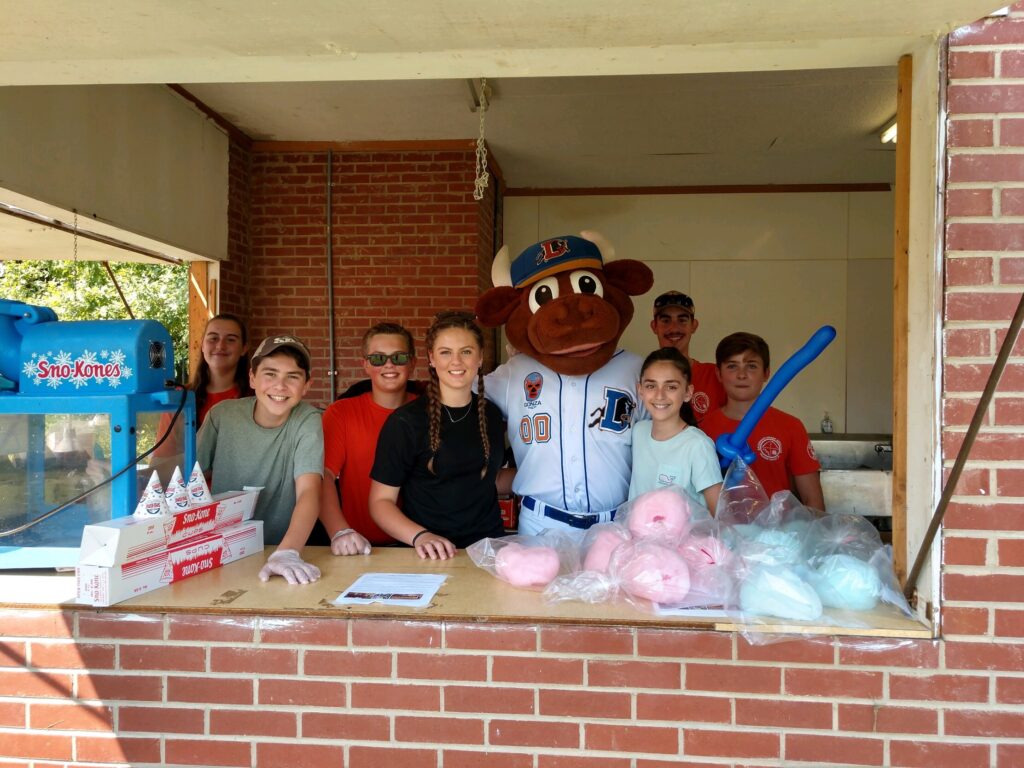
Members of the Backroad Sharp Shooters 4-H Club volunteering at the Ruritan Family Fun Day. This is an annual service activity for this club.
Oftentimes there will be small service days where the club comes together to do something to thank a sponsor or an individual for some other kind of support. Every year my club asks for a number of members to take shifts working the concession stand at the local Family Fun Day put on by one of our club’s sponsors, the Cedar Grove Ruritan Club. So each July, a few members and a club volunteer leader set up in a little cement block shed by the baseball field serving popcorn and snow cones to whoever comes by. Nothing brings out a servant’s heart like the summer North Carolina heat next to a popcorn machine.
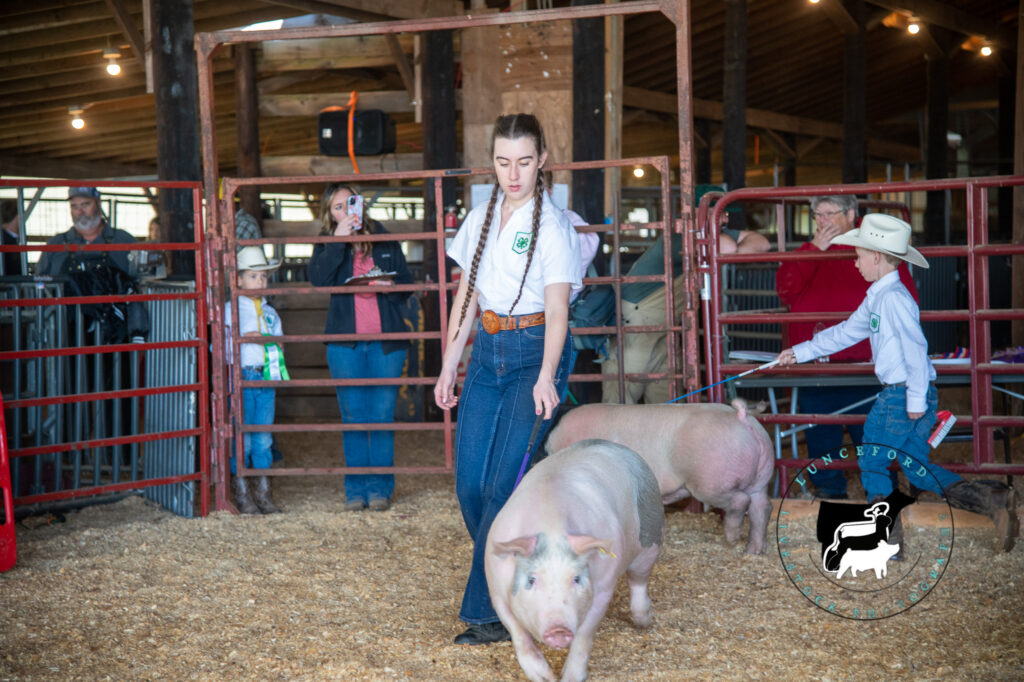
Sarah Beth competing with her market hog at the 2023 Central Piedmont Jr. Livestock Show in Hillsborough. Photo Credit: Tobey Lunceford
Finally, “we pledge our health to better living”. Of course, critical thinking is a massive part of the 4-H mission and it is a useful tool when it comes to making decisions about one’s health. In addition to concentrated clubs and courses, entire weeks of statewide excitement over learning about growing one’s own food, taking care of livestock and cooking healthy meals, taking care of one’s health is a very big deal. One such healthy living experience offered by North Carolina 4-H is the Dinah Gore Healthy Food Challenge, a cooking contest where a team is given a list of healthy local ingredients to include in a dish and a few random ingredients for extra points. During the COVID-19 pandemic, my friend and I participated in the inaugural contest. We created a recipe from the provided ingredient list and made a video presentation of the process that detailed the nutritional benefits of the dish and celebrated the state’s agricultural diversity. At times, it felt like utter chaos (with Cheez-It crumbs sprinkled on top of a casserole because you have to get those bonus points) but it was great fun! We learned how to determine nutritional value in homemade meals, about the most prevalent produce in North Carolina’s economy, and put the whole video together in her room on her sister’s laptop. In the pursuit of cuisine, we learned lessons in research, economics, and videography. 4-H often doesn’t just teach you one lesson at a time if there are as many as four lessons you can learn while celebrating what makes your state a place to be proud of.
It is right there in the pledge that community is a massive part of the 4-H experience. The organization carries out its mission all over the country. But the county level is where the magic really happens in the life of members. It’s being in this little club with kids that a student not only shares interests with but might go to church with, might have classes with at school, might have had the same teachers when they were younger. This local interconnection tightens the community and the 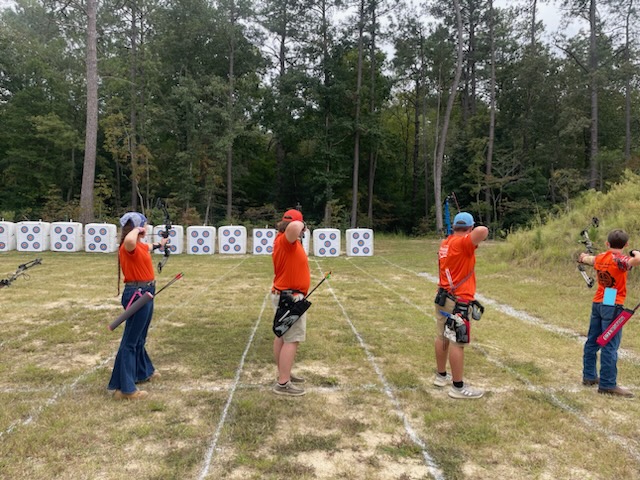 comradery in people starting out when they are small and making sure they do not miss out on civic involvement. Whether it is having a club float in the town parade or a simple letter asking youth to watch the president’s inauguration, 4-H wants you to get involved and thinking. In more rural counties, 4-H is almost a rite of passage for many children, whether they grew up watching an older brother showing goats as I did, or they are the older child and their mother is pulling out all her old achievement pins she earned and wore in the ‘80s to inspire them to do even more. For me, 4-H involvement has always been motivated by family. And even if your own family wasn’t in a 4-H club growing up, a club will be family to you if you will let it be!
comradery in people starting out when they are small and making sure they do not miss out on civic involvement. Whether it is having a club float in the town parade or a simple letter asking youth to watch the president’s inauguration, 4-H wants you to get involved and thinking. In more rural counties, 4-H is almost a rite of passage for many children, whether they grew up watching an older brother showing goats as I did, or they are the older child and their mother is pulling out all her old achievement pins she earned and wore in the ‘80s to inspire them to do even more. For me, 4-H involvement has always been motivated by family. And even if your own family wasn’t in a 4-H club growing up, a club will be family to you if you will let it be!
There is hardly a rival to 4-H. From a little kid just out of preschool to a high school senior who is trying to become a leader herself, everyone that truly gives their time even for a year to a program or club comes away with a little piece of that 4-H spirit that has been championed for more than a century. It educates and enlightens a person, lifts up others, and teaches members to lift up others. It teaches them how to take care of themselves and how to take care of a family one day (as well as those considered as close as family). 4-H is all about community, bettering the community, and bettering one’s own home and body.
Ready to start your 4-H journey? Visit 4h.org. Orange County residents can also visit the Orange County 4-H website or N.C. Cooperative Extension–Orange County website for county-specific information. N.C. Cooperative Extension is an equal opportunity provider.





